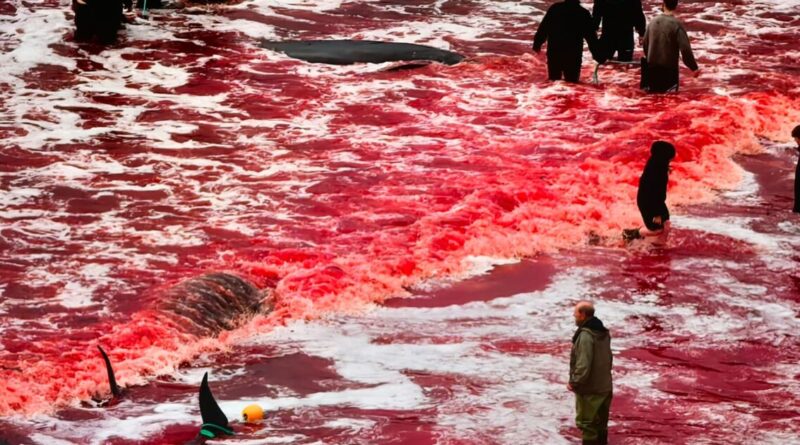Sea turns red with blood as dozens of dolphins slaughtered to death | World | News
Horrifying scenes show a cove turned red by dolphin blood as the first animals of the summer are butchered in the latest hunt on the Faroes Islands. One image captured a child in a rainbow onesie looking at the animals being slaughtered in the shallow waters at Leynar, a village on the archipelago just 230 miles north of Scotland.
The bloodthirsty scenes coincide with a visit by the Danish King Frederik and Queen Mary to the rugged islands in the North Atlantic. Animal welfare campaigner Dominic Dyer said: “Despite the best efforts of the Faroese Government to promote the islands as a destination for bird watchers, tour ships and music festivals, it cannot escape the blood red sea images of the whale and dolphin hunts, which horrify and repulse people around the world.
“Denmark which provides significant financial support to the Faroe Islands has for too long turned a blind eye to the whale and dolphin killing and it should now use its political influence to end this barbaric slaughter.
“The British Government has a trade deal with the Faroe Islands which is worth over £250 million in terms of annual exports of wild and farmed fish from the islands. If the Government is serious about Britain having a global leadership role on wildlife protection, they should suspend this trade agreement until the Faroe Islands Government consigns the cruel whale & dolphin hunts to the history books where it belongs.
“No cod or farmed salmon in our supermarkets is worth the brutal slaughter of thousands of pilot whales and dolphins in the Faroe Islands”
Claire Bass, senior director of campaigns and public affairs at Humane World for Animals UK, warned the Faroe Islands’ tourism board describes the islands as ‘Europe’s best kept secret’ but “there’s nothing secret about these open-air bloodbaths”.
She added: “It’s tragic that the incredible natural beauty of the Faroes is overshadowed by its reputation for inflicting such horrific suffering on families of whales.
“I have witnessed the aftermath of a grind and the image of partially decapitated calves laid on the dock next to their mothers is one that will never leave me. These hunts have been happening for hundreds of years but traditions can and should evolve, and culture can never be an excuse for cruelty.
“The UK is a major market for Faroese trade and we should make our trading relationship contingent on the Faroes committing to stop the slaughter and start a new chapter of compassion and respect in their long history with whales.”
Campaigners have said the UK’s £1.3billion imports of Faroese fish each year props up the industry which fuels the hunts.
The island nation’s dolphin hunts involve powerboats driving the marine mammals to shallow waters before they are killed in designated killing bays with lances and knives.
Whaling is a tradition on the archipelago which sees the animals, usually dolphins, driven into shallow bays and killed with with lances and knives.
Danny Groves, head of communication at Whale and Dolphin Conservation, said: “Each year over 100,000 dolphins and small whales are killed in hunts across the globe but the Grind in the Faroes are some of the most vicious. There is no need for these opportunistic hunts to continue in the modern world.
“The requirement to meet nutritional needs is no longer an excuse for this awful cruelty. Pilot whale meat is contaminated with heavy metals and comes with Faroese health authority toxicity warnings for those who may wish to eat it. It is estimated that since 2010 around 900 pilot whales and dolphins are slaughtered in Faroese each year and their deaths are horrific. Family groups are driven to shore where blunt metal hooks are sunk into their blowholes. They are dragged up the beach where they are often killed in a very rudimentary way.
“Pilot whales and dolphins are paralysed and killed with a spinal lance (a tool with a double-edged blade). Death is agonising and often very slow. Whales play a vital part in keeping the ocean healthy, and a healthy ocean helps our collective fight to reverse climate breakdown. We need more whales in the ocean not less. These hunts are totally pointless.”





